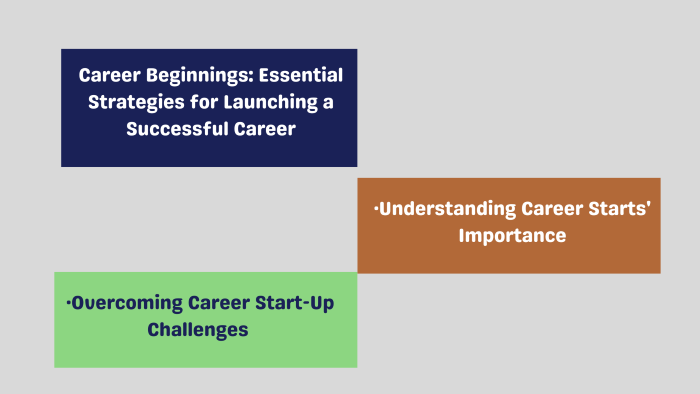
Career Beginnings: Essential Strategies for Launching a Successful Career
- Understanding Career Starts’ Importance
- Key Career Start-Up Strategies
- Overcoming Career Start-Up Challenges
Introduction
Career start-ups are crucial to success. Whether you’re a fresh graduate or switching careers, your early attitude may shape your career. This article discusses practical ways to construct a firm foundation, overcome obstacles, and set the stage for long-term success.
Understanding Career Starts’ Importance
• Foundation for Growth
Early professional experiences provide the framework for future chances. These early positions frequently shape your career. Starting as a junior in an industry can lead to more advanced jobs as you develop experience and expertise.
• Skill Development
First jobs offer valuable opportunities to develop and polish skills for your career. Practical knowledge and insights from these experiences help you progress. An entry-level marketing job may teach you campaign management and data analysis.
• Networking Opportunities
Beginning your career is suitable for creating professional ties. Networking with peers, mentors, and industry professionals may give you job chances and assistance. Industry events and professional organizations can expand your network.
Key Career Start-Up Strategies
1. Define Career Goals
A tremendous professional start requires clear goals. How to set and achieve them:
• Define Your Goals
Start by defining your career goals. It involves choosing positions, sectors, and milestones that match your goals. To be a project manager, create goals like getting project coordinating experience and credentials.
• Develop an Action Plan
Plan your professional goals in detail. This plan should contain short-term goals like getting an internship and long-term goals like promotion. A clear action plan helps you focus and measure success.
2. Strengthen Resume and Online Presence
An excellent first impression depends on your CV and web presence. How to improve them:
• Create a professional resume
Highlight critical abilities, experiences, and achievements for the job application. Emphasize that your background matches each job on your CV. Include “Increased social media engagement by 30%” to demonstrate your influence.
• Improve Your Online Presence
Create a great LinkedIn profile highlighting your professional achievements. Keep your profile updated with new skills, certificates, and jobs. Build a solid online network by engaging with industry material, joining relevant organizations, and networking with professionals.
3. Network strategically
Career progress and possibilities depend on networking. How to network effectively:
• Explore industry events
Attend conferences, symposiums, and workshops analogous to your field. These events let you network, learn about new trends, and meet industry leaders. Tech conferences may introduce you to employers and industry leaders.
• Utilise social media
Engage professionals and industry experts on LinkedIn and Twitter. Join relevant groups, talk, and share your views to gain recognition. You may boost your career by engaging with industry content and influencers.
4. Find Mentorship
Mentorship helps you start your career. How to locate and use a mentor:
Identify potential mentors
Find people with career expertise who can give advice and insights. Contact people you admire or want to work in. Find a successful financial mentor if you’re interested.
• Establish a Relationship
Tell potential mentors what you want from the connection. Accept their criticism and appreciate their time. Discuss your progress, ask for guidance, and resolve any issues during frequent sessions.
5. Gain Key Competencies
Career success requires developing essential abilities. Focus on skill development:
• Identify necessary skills
Determine the abilities needed in your field. SEO, content production, and analytics may be helpful if you’re into digital marketing. Find the most valued talents by studying job advertisements and industry trends.
• Seek Learning Opportunities
Use courses, certificates, and training to improve these abilities. Take online classes workshops, or get industry certifications to improve your skills. Continuous learning helps you compete and adapt to industry changes.
6. Be Positive and Flexible
Positive thinking and flexibility help overcome obstacles and seize opportunities. How to develop these traits:
• Be resilient
A career starts frequently with setbacks. Be cheerful and see challenges as learning opportunities. Take a challenging assignment as an opportunity to strengthen your problem-solving abilities.
• Adapt to Change
Be flexible in your job path and open to new experiences. Adaptability lets you change course and seize chances. Accept changes in your job and adapt to new difficulties.
Overcoming Career Start-Up Challenges
1. Handling Uncertainty
Career indecision is widespread. To address this, explore other roles:
- Several positions
Try several positions or projects to discover your passions and skills. This exploration informs professional choices. For instance, try several projects or internships to find your job passion.
• Seeking Guidance
Ask mentors, coworkers, or career counsellors for guidance. They can offer insights and ease Uncertainty. Ask pros for career advice and experience.
2. Balance Expectations and Reality
It’s hard to balance expectations with realities. Address this by:
• Setting realistic expectations
Understand that careers start with entry-level jobs and gradual advancement. Career growth requires patience and reasonable goals. Accept that career improvement takes time and focus on the necessary measures.
• Regularly Evaluate Progress
Regularly assess your career goals and accomplishments. Assess your progress and change to match your professional path and prospects. Regular assessments help you keep on track and make modifications to reach your long-term goals.
Conclusion
Career starts are vital to your career. Career success may be achieved by defining objectives, having a great résumé and online presence, networking effectively, finding mentoring, improving critical skills, and being positive. Use the obstacles and possibilities of starting your profession to succeed and be happy.
